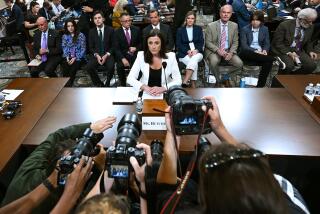White House to Push Tougher View of McLarty
- Share via
WASHINGTON — Top Clinton Administration officials have mounted a quiet effort to counter perceptions that Chief of Staff Thomas (Mack) McLarty lacks firm control over the White House staff or necessary knowledge of some policy debates.
Worried that such views may reinforce Whitewater-fed perceptions of a White House in disarray, aides are trying to show off McLarty’s firm side, increase his visibility and publicize support from his boyhood friend, President Clinton.
McLarty has always been more of a coordinator-in-chief than an autocratic taskmaster, in keeping with his boss’s preference. But some recent events, including White House officials’ response to the Whitewater controversy, have suggested that the former utility company executive is simply not in the loop on some key issues.
That, in turn, “reinforces this idea that the place has no focus,” one White House official said. With the White House now needing to summon all its influence for looming fights on health care reform and other legislation, “that’s not good for the President,” the official added.
Some White House allies on Capitol Hill say the matter points to a broader issue of whether the White House’s decentralized organization is best suited to getting things done. They say that while the system may foster a free flow of policy ideas, it often makes it impossible for outsiders to pin down definitive Administration positions without talking to the President himself. Even congressional committee chairmen have sometimes felt the need to try to call Clinton, they say.
An outside adviser to the White House, saying aides have recently become more concerned about the perception of organizational drift, predicted that the effort to promote McLarty would be aggressive. Officials said these efforts have already been under way for a number of weeks.
White House aides have been promoting news stories that portray McLarty as asserting stronger control over staff operations. When McLarty recently warned staff members in blunt terms not to meddle in the Whitewater probe, aides made sure the exchange was publicized.
Another sign of the effort came during a photo session set up last Monday to record a meeting of the National Security Council and the White House senior staff. McLarty, who is seldom at the center of gatherings of senior foreign affairs staff, was seated next to Secretary of State Warren Christopher.
Events of recent weeks have brought repeated suggestions that McLarty was somewhat removed from White House deliberations.
When questions surfaced last month about contacts between some senior White House staff members and the federal regulators overseeing Madison Guaranty Savings & Loan, the failed thrift at the center of the Whitewater case, McLarty turned out to be uninvolved. And he was not among the parade of top aides subpoenaed to talk to a federal grand jury about the conversations.
Arguably, this reflected well on McLarty. But it also suggested that he was at a certain distance from one of the White House’s primary preoccupations, some White House aides acknowledge.
Somewhat the same impression was created by disclosures that about a third of White House aides had so far failed to arrange permanent White House passes, and that many had not received security clearances for access to secret information.
Though not a major issue, McLarty had sent letters to some inquiring lawmakers over the previous half-year assuring them that efforts to complete the work were on time and following procedures.
The incident suggested that McLarty had been unaware of a bottleneck in the White House counsel’s office.
McLarty, unfailingly courteous and well-liked by the White House staff, has said from the beginning that his role is not to direct policy-making but to make sure that he knows of key events and to keep the process running smoothly.
He has had a special role as chief White House emissary to corporate leaders and some senior members of Congress, especially conservative Democrats. He provides Clinton the benefit of his counsel, which last summer included a recommendation that David Gergen be hired to help lift the White House from the doldrums of its first rocky months in office.
Philip Lader, a deputy White House chief of staff, said that under McLarty’s leadership, the White House has adopted a non-hierarchical management style that many businesses, such as software giant Microsoft Corp., have found to be the best way of coping with their fast-changing markets.
One White House adviser said that Harold M. Ickes, a deputy White House chief of staff, has begun helping McLarty run a more assertive command.
But others disputed this, insisting that there had been no operational change and that McLarty is doing precisely as the President wishes.
The issue of the chief of staff’s management has caused a division among White House aides. Several ventured the view that Clinton may sooner or later feel the need to bring in a different kind of chief. But many others doubted the President would consider such a move.
In any event, several agreed that the chances of any change would remain low during the course of the Whitewater matter because an ouster could be read by outsiders as an indication that the troubles were taking a heavy toll on the White House.
Some officials say the problem is complicated by McLarty’s reluctance to take credit for what he does accomplish, a habit that tends to place him in the background.
Some White House advisers say the Administration’s accomplishments show the issue of organization is irrelevant in any case.
“George Bush had a very tightly disciplined, well-ordered White House,” said Paul Begala, a political consultant and White House adviser. But, on domestic affairs, at least, “he didn’t do anything.”
More to Read
Get the L.A. Times Politics newsletter
Deeply reported insights into legislation, politics and policy from Sacramento, Washington and beyond. In your inbox twice per week.
You may occasionally receive promotional content from the Los Angeles Times.











